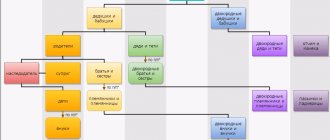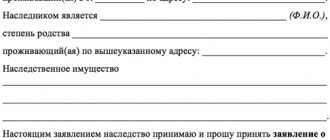Share of property in inheritance and the right of compulsory share
Under this regime, the property rights of the deceased testator, at the time of opening of the inheritance, are transferred to another heir. In cases where there are several heirs, property rights are distributed among them depending on the actual line of succession. If we are talking about an apartment, the total size of the area is taken into account, which is divided between the heirs in accordance with their number and taking into account the queue. Any heir has the right to refuse the share offered to him.
In addition, the legislation of the Russian Federation also provides for the right of a compulsory share, which appears to a certain heir from the date of opening of the inheritance, regardless of his inheritance order and the information provided by the testator.
In cases where the requirements in a testamentary document contradict the data on the mandatory inheritance order, it may be declared invalid.
The list of heirs entitled to an obligatory share in the inheritance includes:
- a minor or disabled child of the testator;
- disabled spouse, pensioner or parents of the deceased testator;
- disabled dependents, elderly people, pensioners, etc.
The size of the heirs' share is legally established by the court. At the same time, he takes into account the interests of each heir, his position in the inheritance line, as well as other mandatory factors. If no disputes arise between the heirs, it is permissible to conclude an agreement on the distribution of shares in the inheritance of a deceased relative.
If the inheritance includes a plot of land or a private house, this property is subject to distribution among the heirs.
The size of a plot of land or part of a house for each of the heirs can be established within the framework of the court or through an agreement. A sample of this agreement between the heirs should be studied in advance, otherwise, if there are certain errors and inaccuracies, it may be declared invalid. Any heir has the right to renounce his obligatory share from the moment the inheritance is opened. A sample application for refusal can be obtained from the notary chamber.
Amount of mandatory share for pensioners
The pensioner is entitled to 1/2 of the share of the legal heir. The calculation of the share is made based on the number of identified legal successors.
Example. After the death of a person, an inheritance was opened. The object of inheritance is a private house. The owner transferred the property to his daughter and brother. His retired mother lived with the testator. However, she was not mentioned in the order. When dividing property according to the law, the mother is entitled to ½, since in the event of inheritance without a will, the rights to the property would arise from the mother and daughter of the deceased. If there is an order, the share is reduced to ¼ part. The remainder of the property is divided among the heirs according to the will.
What is the mandatory part? If property is identified that is not specified in the will, then the obligatory share is allocated from it. In the absence of additional assets, the share is separated from the total mass. Consequently, the portions of legal successors under a will are subject to reduction.
Is it possible to inherit a compulsory share in the order of presentation? No. This option is not provided. In the event of the death of a mandatory bidder, the property due to him is redistributed among the remaining participants.
Shares of heirs of the first and second stages
The specified shares of heirs in the bequeathed property may differ from those obligatory shares provided by law.
Legal practice and established laws provide that heirs are called upon to inherit in the order of existing queues.
Heirs of the first stage have the most rights to inheritance. These include a child, both an adult and a minor, as well as the spouse or parents of the deceased testator. All of them have the right to inherit property, be it a private house or part of a plot of land, rooms in an apartment or a certain amount of dividends, in equal shares. If there are no first-line heirs or if one of them dies, the right of inheritance passes to the next candidates. This also includes cases where the heirs of the first stage, after the opening of the inheritance, decided to refuse it.
Next after the first, the right of inheritance passes to the heirs of the second priority. This includes siblings, grandparents, and children of the testator's siblings. If the testamentary document, recognized as valid, indicated the shares of the heirs, and they do not contradict the mandatory shares, this information is taken into account, otherwise, the data specified in the testamentary document will not be taken into account, since it may be declared invalid. For the heir of any queue - first, second, etc. the right to refuse to receive his share of the inheritance remains; he can use it at any time from the date of opening of the inheritance. A sample application for refusal to acquire inheritance rights can be found at the notary chamber.
Sequence
Now there is the following procedure for inheriting part of the property :
- 1 – spouses, parents and children;
- 2 – brother, sister, grandfather and his wife;
- 3 - Uncle Aunt;
- 4 – great-grandfather, great-grandmother;
- 5 – children of cousins, siblings of grandparents;
- 6 – grandchildren of nephews, nieces, children of cousins, cousins, uncles and aunts;
- 7 – stepson, stepdaughter, stepfather, stepmother.
When the indicated applicants are not among the receivers, then the disabled dependent of the deceased receives the rights to the property . If the applicant, by law, does not live to see the division of property, then the inheritance rights are transferred to his successors. This is called view inheritance .
Allocation and registration of shares of heirs
The determination and allocation of shares of heirs is a special legal procedure for establishing the size of the share of a specific property - a house, area in an apartment, land, etc., for each of the heirs. Very often this happens in the courtroom, since the heirs have different ideas about how much they are owed, and other disagreements between them. Very often, during the court process, the need also arises to deprive someone of an inheritance and its actual share due to the fact that they are unworthy heirs.
The determination of the shares of the inheritance occurs on the basis of all the data on the property included in the inheritance mass on the proposal of the judge.
The heirs themselves can determine what the size of each share is, but the court still has the right to change it, and it can adjust it. At the initial stage, each heir can refuse the inheritance if he does not want to acquire inheritance rights. Then the established amount of his share, upon the proposal of the court, passes to the next legal successors. If the court decides to deprive the heir of the right of inheritance, his share also passes to another candidate or is divided between the participants into several equal shares.
A sample lawsuit can be found at the court office for review.
The decision to determine shares is made by the court based on all available data. Additional information also includes facts such as whether any of the heirs is in the care of a minor child or a retired relative. If, for example, there is a pensioner, the court may decide to increase the share of the inheritance, and, on the contrary, deprive someone of the inheritance due to the emergence of special information. The court also has the right to consider what the heirs’ shares in the bequeathed property are and their size in order to compare whether they comply with the requirements of the law.
The share of heirs by right of representation and its transfer by will
Acquiring property inheritance rights is a rather labor-intensive procedure. And it doesn’t matter what exactly an individual inherits - the testator’s car, his house or a room in the apartment of another relative of the testator.
Often the procedure for distributing property turns out to be not at all as simple as it seemed, this affects the period allotted for the acquisition of inheritance rights, which can be quite delayed.
In addition to the transfer of inheritance according to the first, second and other stages, there is also inheritance according to another right - the right of representation. It applies in the case where the heir of another deceased person himself died before the opening of the inheritance, when the acquisition of rights has not yet taken place. For example, when an adult or minor child of the testator also died before completing the inheritance on time. Then this inheritance will be received in equal shares by the closest relatives of this child - the heirs of the first and second stages.
Shares of heirs can also be transferred by will. For example, a testator can accurately indicate the size of a share or several equal or unequal shares in a privatized apartment, which should go to a specific heir. The same applies to parts of the land plot and financial share in the authorized capital.
In inheritance law there is the concept of hereditary transmission. It implies those cases when, during this transmission, the heir dies after the opening of the inheritance. In accordance with the transfer, the property of this heir will pass to another person who also laid claim to it before the transfer. The procedure for transferring property through transmission is standard, as in ordinary inheritance.
How is disability confirmed?
To confirm the inability of a person to carry out labor functions to provide himself with the necessary financial resources, the following grounds are used:
- retirement age (for men, starting at 60 years old and for women starting at 55 years old);
- availability of a pension certificate obtained in accordance with the procedure established by law;
- early retirement for persons with a disability confirmed by a certificate.
When the parents are not supported by the testator, retirement due to length of service or disability will not always be grounds for recognizing them as incapacitated.
Important! The successor's retirement must take place at the time of the testator's death.
Deprivation of an heir's share and acquisition of a share from another
The judicial system of the Russian Federation and the established procedure provide for the possibility of depriving the share of any of the heirs if this decision is justified and all the necessary evidence is available. Otherwise, it may be declared invalid.
It is possible to deprive a valid share of the inheritance if the interested party can prove that the heir’s actions had negative consequences for the testator, damaged his property, showed negligence, did not fulfill his duties, did not provide due attention, if the testator was an elderly pensioner, etc. d.
Recognizing an heir as unworthy and further deciding to disinherit him entails certain consequences.
First of all, his property share is divided among other claimants who are entitled to it by law. If the property cannot be divided, the court may establish mandatory payments to compensate the cost of this share to other heirs. The heir must make payments within the prescribed period, from the moment the decision was made. Also, other heirs can simply buy out this share, which is included in the circle of inheritance, at a certain cost. You can buy it out either in court or through an agreement. The size of the cost, the sale - its procedure and terms are established by the parties. A sample of such an agreement can be found at the notary office.
The procedure for paying shares to heirs and its size in an LLC
In the event of the death of a citizen, ownership of the property or its share in the authorized capital is transferred by inheritance to other persons. If the heir formally refuses to receive this share, this entails the company’s obligation to further pay compensation.
The form of compensation also allows for the possibility of compensation with property in the form of dividends.
The share of property in the authorized capital is inherited by one or more heirs, regardless of whether the circle of other participants agrees with this. A ban on this cannot be imposed, since it will be declared invalid.
The sale of one's own share can be carried out at the request of the heir himself. To do this, he makes appropriate representations and demands that the company compensate the property located in the authorized capital and located in the inheritance estate. If the parties do not have any disagreements, you can draw up all the necessary documents and enter into an agreement to compensate for the cost of the share in the authorized capital. If disagreements that cannot be resolved still exist, the final decision will be made by the court.
In addition, the new owner of the organization has the right to pay dividends that were in the authorized capital after the death of the previous shareholder. The right to receive dividends remains with the new heir, since it passes to him by way of succession. Refusal to pay dividends can always be appealed through court.
Agreement on the division of inherited property
If there are several heirs, they can enter into an agreement on the division of property received by inheritance.
Before formalizing and signing such a transaction, each of the applicants for the inheritance receives from a notary a certificate confirming the right to the inheritance.
Now the heirs have the right to enter into an amicable agreement on the division of bequeathed property.
It is important to know that only property owned by heirs under the right of common shared ownership can be divided. Before receiving a certificate of inheritance, property can be divided, provided that it does not include real estate.
The agreement may indicate the following points:
- procedure for dividing property;
- funds can be divided after the sale of property;
- After the division of the inheritance, the appointed persons can legally dispose of and use their share.
Information!
If among the heirs there are minors, individuals with limited legal capacity and those who are completely incapacitated, then a transaction on the division of property can be concluded only after obtaining consent from the guardianship and trusteeship authority.
Unequal shares of heirs under a will
In his testamentary document, the testator has the right to indicate absolutely any size of share for each of the heirs. For example, one room in a privatized apartment is enough for one person, two are enough for another. The same situation may arise with privatized or non-privatized land. Some heirs may receive a much larger portion of the property than others. That is why the legislation of the Russian Federation provides for the sale of one’s own inherited share.
Absolutely every heir has the right to sell his share. The exact amount of the cost should reflect the current condition of the property, as well as other nuances. But other heirs will never force the share to be forcibly sold to them by their mere desire, since this would be illegal. This applies to both a privatized apartment and any other inherited property, the sale of which is possible only with the consent of the heir. An interested person can notify the heirs of the sale of his privatized or non-privatized property share personally or through other notifications.
In the inheritance law of the Russian Federation, there is such a thing as an increment of inherited shares. It implies that the share of the fallen heir is added to the existing shares of others. Increment can be carried out both by inheritance by law and by will. In this case, the share of the fallen heir and its increment can also be a share both by law and by will. The increase in the share of a fallen heir is a rather independent legal phenomenon.






